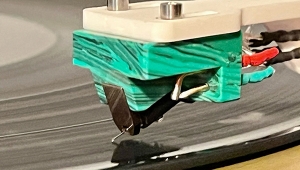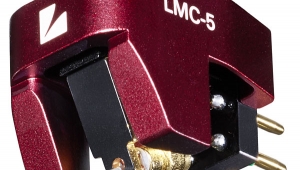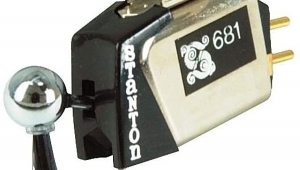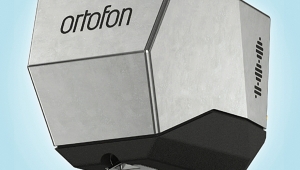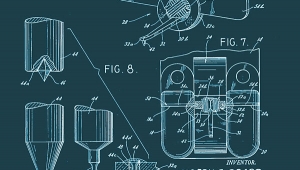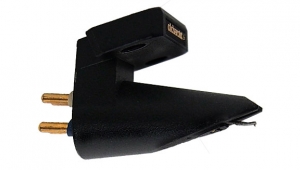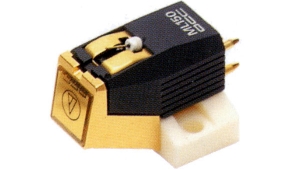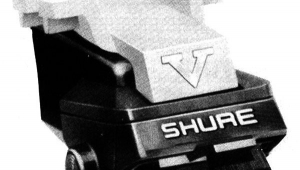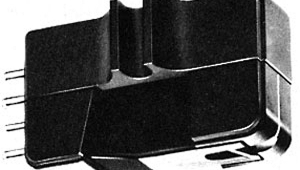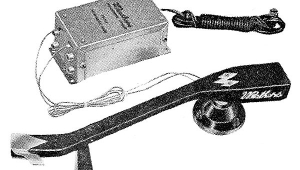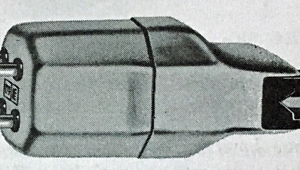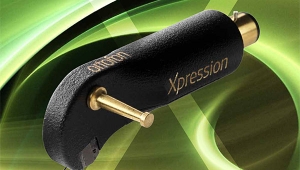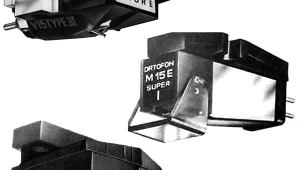| Columns Retired Columns & Blogs |
Benz-Micro MC20E2-L MC phono cartridge Page 2
The MC20E2-L was smooth (as in not screechy) and reliably pitch-accurate in my system, with very good tonal balance overall and a medium to up-front spatial presentation. While it wasn't as sweetly, believably textured or as musically nuanced as the more expensive cartridges in my collection, the Benz reproduced surprisingly good string tone from well-recorded classical LPs. During its time here, and for whatever reason, I was on something of a chamber-music kick, and I listened to one record in particular literally every day for over a week: a Japanese reissue of Beethoven's Septet in E-flat Major, Op.20, performed by members of the Vienna Octet (London/King KIJC-9111). I played it with a Miyabi 47 ($3950), a Koetsu Black ($1600), and an EMT JSD 5 ($2850), in addition to the $199 Benz: All of the far more expensive cartridges had certain qualities in their favor compared with the budget Benz, but none embarrassed it in any way, shape, or form. And, yes, I sometimes caught myself half-consciously calculating the number of records that each difference in price could buy.
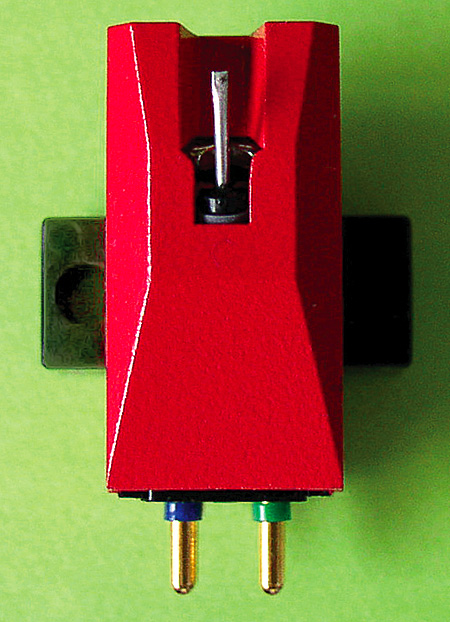
As with other low-output cartridges that also lean toward the low-compliance side of the fence—sorry to paint with so broad a brush—the Benz was unfailingly dramatic. On the Jascha Heifetz recording of Tchaikovsky's Violin Concerto (RCA Living Stereo/Classic LSC-2129), the MC20E2-L did a fine job of getting across the tactile aspect of Heifetz's playing—especially the bounce of the bow against the strings in his most aggressive attacks. On the downside, it got a little bit hard in the loudest passages. Dynamic and dramatic swings of a more obvious sort were had from the rightly famous recording by Woody Herman and his orchestra of Stravinsky's Ebony Concerto (Everest SDBR-3009). Snare drum, bass drum, piano, string bass, and a strongly plucked harp alternate with the usual brass and woodwind instruments on this brilliantly made recording, and with the Benz in place, those sounds leaped from the speakers with all the force and presence I could have wanted. The very-low-output Miyabi 47 did even better in that regard—but not by as wide a margin as you might expect.
Tunefulness and pitch relationships were fine with the MC20E2-L, and its pacing was faultless, whether following Ruggiero Ricci's brisk performance of Novácek's Perpetuum mobile (Turnabout TV 34722) or putting across the snap in the beat of the title song of Phil Ochs's Tape from California (A&M SP4148). Todd Phillips' "rhythm" mandolin and Bill Amanteek's upright bass had a fine sense of drive throughout the David Grisman Quintet's first, eponymous album of 1977 (Kaleidoscope F-5), with "Dawg's Rag" and "Opus 57" in particular kicking lots of righteous ass.
The Benz's most apparent shortcoming—quite possibly its only significant shortcoming—was a lack of extreme bass depth and weight. Orchestral drums in particular, as in Sir Adrian Boult's recording of Elgar's The Dream of Gerontius (EMI SLS 987), Jascha Horenstein's version of Mahler's Symphony 3 (Nonesuch HB-73023)—and, especially, a fine new reissue of Mussorgsky's Pictures at an Exhibition, with Antal Dorati and the Minneapolis Symphony (Mercury Living Presence/Speakers Corner SR90217)—didn't have as much impact with the MC20E2-L as with the Koetsu Black or Miyabi 47. The same was true of the bass-pedal sound on that king of all What the hell was I thinking when I bought that? albums, the live Seconds Out by Genesis (Atlantic SD 2-9002): With the Benz, "Squonk" just didn't do it for me.
Yet, notably, the Benz didn't sound light or lacking in richness throughout the rest of the spectrum; the contrabassoon in the Mussorgsky, for instance, sounded like itself and not some thin, pale imitation. Midbass and upper bass were fine and full: There just wasn't as much of the deep stuff as I would have liked.
The Benz did well enough in terms of shrugging off ticks and pops, although it wasn't up to Koetsu Black levels of silence in that sense. For whatever reason, it was better at ignoring steady-state groove noise—or at least not making too big a deal of it. Especially after a good cleaning on a freshly restored Keith Monks RCM, all but the crappiest LPs were enjoyable with the MC20E2-L.
Similarly, the Benz was a decent tracker, if not up to the best. Nothing in my rock-music collection gave it any trouble—unsurprising, given how truly undynamic most such recordings are—and it sailed through nine out of ten classical records without a hitch, showing a bit of hardness only with the loudest vocals, solo violin (as noted above), piano, and percussion, the last including the raucous cymbals on Ernest Ansermet and L'Orchestre de la Suisse Romande's surprisingly well-recorded disc of highlights from Delibes' Coppelia (London CS 6128). Regarding the Benz's tracking, the Hi-Fi News test record came to pretty much the same conclusion: good but not great.
Conclusions
All too often, regardless of what the writer intended, reviews of affordable products are remembered more for their complaints than for their praise: It wasn't as good as this. It wasn't as good as that. It did all right, considering.
The alternative may be some variation on the phrase It punched above its class—which, while clever, is fast approaching its sell-by date, forcing some of us to look for variations: It shot below its handicap. It married above its station. It killed beyond its caliber.
But shortcomings are inevitable, even in not-so-cheap products. The real story here is how good the Benz-Micro MC20E2-L is: how smooth, how tuneful, how present-sounding, and, above all, how dramatic and involving. Except to the person who lives on a steady diet of "Squonk" and hard-to-track heldentenors, the MC20E2-L would have to be considered a good phono cartridge at any price.
Phono enthusiasts with limited budgets should put this cartridge squarely at the tops of their lists, as should anyone who sees the wisdom in having a spare for a rainy day. The Benz-Micro MC20E2-L is a wildly good value for the money—as we say in the biz, it nests beyond its habitat—and it's vinyl-friendly in every sense. Very strongly recommended.
- Log in or register to post comments
